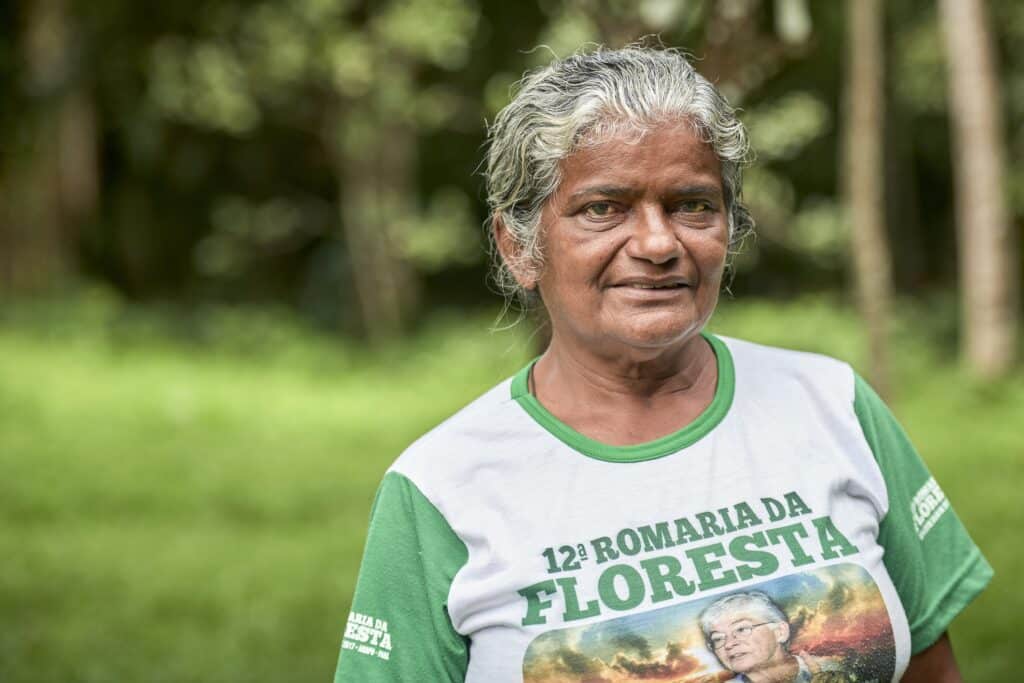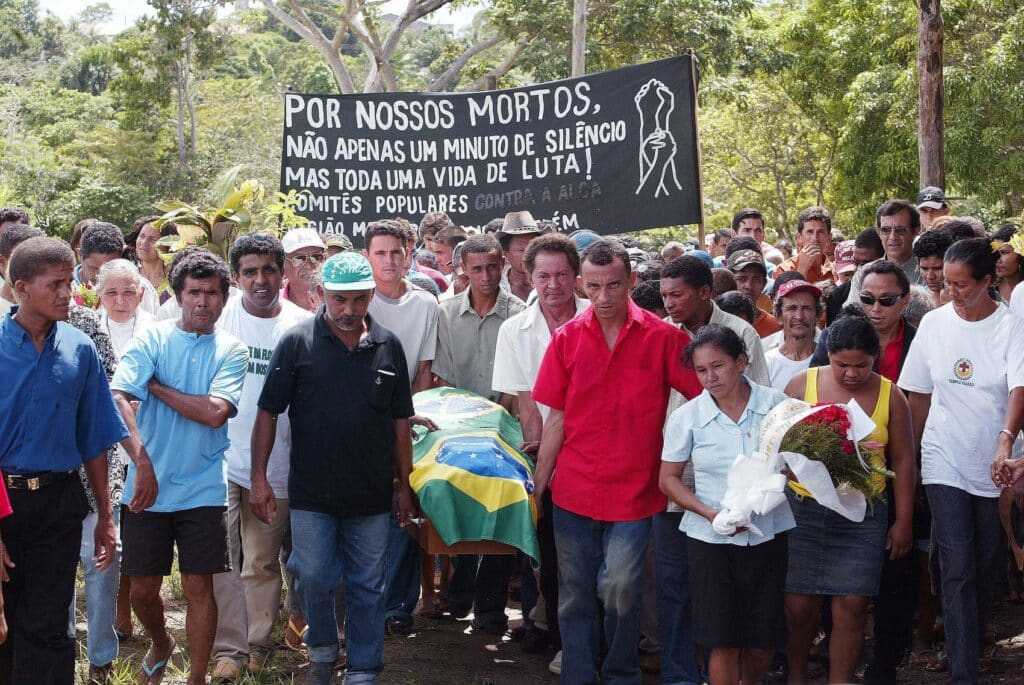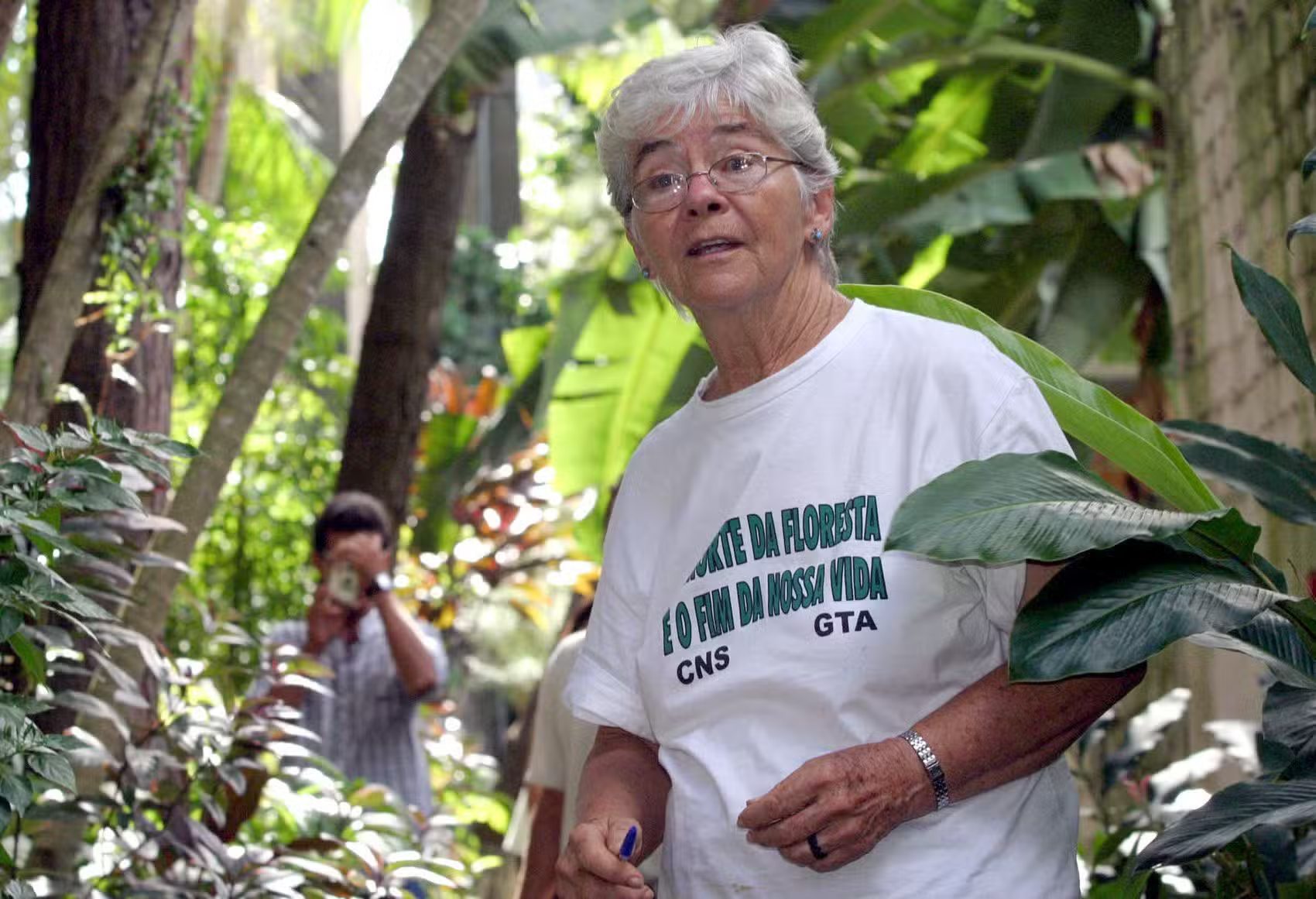Murdered for her defense of the farmers and the rainforest of Brazil, this Notre Dame sister died with great courage and faith.
Even as Sister Dorothy Stang—dedicated activist for human rights and the protection of the Amazon rainforest—faced her hired killers in a desolate stretch of the Amazon region, she remained focused on the Gospel’s message of love.
Calmly pulling out her Bible, Sister Dorothy, of the Cincinnati-based Sisters of Notre Dame de Namur, began reading Scripture to the men who were about to take her life. Sister Dorothy’s assassination on February 12, 2005, made international headlines as a result of her 38 years of championing the rights of the poor in Brazil. But where and how did this 73-year-old woman gain such courage and understanding of Christ’s teachings?
It likely began in Dayton, Ohio, where Dorothy—known as “Dot” to her family and friends—and her eight siblings learned reverence for God, compassion for others and the value of hard work through their parents, Henry and Edna McCloskey Stang.
“Our parents were people of deep faith,” says Sister Dorothy’s brother, David Stang, a former Maryknoll missioner in Africa. “They truly believed they were the Body of Christ. We were taught that Christ is inside us and we need to be like Christ and be of service to the poor.”
David recalls how during the Depression, his father—a chemical engineer who knew how to stretch a dollar—took on the financial support of three families: his own, his mother’s and his mother-in-law’s. When his father died at a young age, Henry Stang felt compelled to support his mother and younger siblings.
Then his wife’s father died and since she was the oldest of nine children, the Stangs assumed the responsibility of supporting that family as well. David believes that, as the firstborn in both their families, his parents had obtained physical and spiritual strength and leadership abilities that they passed on to their children.
“Obviously, we, as their children, received quite a gift,” he says.
A Seed Is Planted
Sister Dorothy’s sister Marguerite Hohm, the fourth oldest of the nine Stang children, shares similar memories of her parents. She remembers her father as a frugal disciplinarian whose Sunday routine included giving each of his children an offertory envelope containing 10 cents before Mass and retiring to the privacy of his room after Mass to read his copy of Our Sunday Visitor.
Their mother was a very loving and caring person. Together, the couple balanced the needs of their family and taught their children that giving to charity was essential.
As Marguerite recalls, it was not unusual for the Stang family to take in people struggling to get back on their feet.
“Our home was always open to those in need,” she says. “Many times we had visitors who spent a good amount of time with us until they could get situated in a home of their own. And they were not necessarily relatives, although sometimes they were.”
Some of the food on their table came from the family’s garden, an endeavor that all the children shared in tending and maintaining.
“We grew up on a one-acre lot and half of it was a garden,” Marguerite explains. “We kids didn’t really enjoy working on it because we didn’t like pulling the weeds. Once the garden produced all these vegetables, we had to can them. There was a lot of work involved there.”
But that hard work and knowledge of gardening would prove resourceful for Sister Dorothy in her later calling in the Amazon forest. “I believe her interest in sustainable farming started there in her childhood garden,” says Sister Joan Krimm, S.N.D.deN., Sister Dorothy’s lifelong friend, who has also experienced firsthand the severity of the situation in the Amazon. “Her father had a great love of the land and Dot said she got big hands from pulling those weeds.”
Both parents were also very involved in their church community at St. Rita’s in Dayton, helping to organize festivals and fundraising events and, in the process, competing with one another in raising money for the church.
David and Marguerite speak fondly of their mother running the annual orphans’ home picnic and church fall festival. In both instances Edna Stang was responsible for the kitchen. The orphans’ picnic served about 2,000 people, or as David likes to say, “the entire city of Dayton,” and Edna had to enlist many people to help her, including all of her children.
“That was fun for us, watching my mom handle 25 to 30 women,” David says, “and she’d be right in there with them.”
Apparently, Edna’s cooking was a big draw. “One of the things the kitchen served during the fall festival was turtle soup,” Marguerite says with a smile. “And people came from all over town to get this turtle soup. That was her specialty, I guess.” While Edna was in the kitchen, Henry was in charge of bingo, but he could not compete with his wife’s cooking. David recalls, “When the day was over, I could hear them arguing over who had made the most for the church. Mom always won. I don’t know why he would ask her how much she had made because he knew it would be embarrassing.”
Of the People, For the People
It seems obvious to David and Marguerite now that their sister received her inner strength from her parents and their faith. Marveling over all that she accomplished and wondering how she did it, David poses other seemingly unanswerable questions: “How did my mom do what she did? How did my father support three families?”
But David believes he has an answer. “When it gets mean and tough, you have to go deep inside and find that Holy Spirit inside you,” he says. “Dot believed she had Christ and the Holy Spirit with her, and [her attitude was] get out of my way!”
Both Marguerite and David visited their sister while she lived in Brazil. Marguerite lived there from 1973 to 1975 with her husband, Elmer, who was working on an assignment for the United States Agency for International Development. Even from the beginning, Marguerite was overwhelmed by the desperate conditions of the area.
“I mentioned to her when we were there that I could never do what she was doing, just looking around at the poor, the open sewers, the smell, the filth. Dot didn’t see any of that. All she could see was the love of her people, and they were very loving people.”

When Sister Dorothy arrived in Brazil in 1966, she and the other sisters from her order had thought they were going to teach school. The bishop, however, had other plans. Instead, the sisters were asked to start base communities—small communities of Catholic Christians who read the Gospel among each other but have no priest available.
That’s when Sister Joan was reunited with her childhood friend. The two women had attended St. Julienne High School in Dayton and then entered the novitiate together in 1948. They were later assigned to different states and discouraged from keeping in touch.
Unknowingly, in 1966, they both volunteered to go to Brazil to work with peasant farmers. They established a new convent at Corbatá in the state of Maranhão. Once they arrived, Sister Joan says, “It wasn’t long before we saw the oppression.” The two women worked on the edge of the Amazon region: Sister Joan mostly with youth; Sister Dorothy with adults.
In the 1970s, the government built the Trans-Amazon Highway that led into the Amazon region, and offered a free tract of land to anyone who wanted to move north to populate the area.
“Many of our people began to move to Pará because they saw a chance to own land and property,” Sister Joan says. “Dot thought one of us should go to support them and that’s when she moved up there alone.”
Wealth in Poverty
It wasn’t until Marguerite visited the village where Dorothy was living that she had a glimpse of what her sister was facing. Sister Dorothy lived deep in the woods—under primitive conditions—in a small house with a dirt floor. She had no running water or electricity.
But, as Marguerite says, “she was very happy. She had her own mission. Many times she was alone, but that didn’t seem to bother her, because she was focused on what she was about and what she wanted to accomplish.” Marguerite realized early on that her sister “was already involved in things that we were not totally aware of.”
These “things” turned out to be serving the poor in a very dangerous political situation. Although government-owned land was being offered and the families were supposed to get the legal rights to the land after living on it for a number of years, Sister Dorothy found that wasn’t happening. As more and more families came, the government sectioned off land. As the land was developed, wealthy ranchers and loggers, who were politically influential, wanted a part of it.
Sister Dorothy found the peasant farmers were being harassed, their houses and crops were being burned and some of the people were murdered. She obtained the help of local lawyers to acquire legal documents for the families to protect their rights. She became the mediator between the farmers and the lawyers because the people did not know how to acquire their legal rights. Knowing the value of these land deeds, once she acquired them, she would carry the deeds with her wherever she went, along with her Bible.

To help her cause, Sister Dorothy applied for, and received, Brazilian citizenship. She loved Brazil and everything she did was within the regulations of the country’s constitution, David explains. Despite this, she received death threats from those who wanted the land for themselves. But she was not concerned about her safety, only the safety of “her people.”
“She had a real passion for the poor,” says Sister Joan. “She studied a lot and knew what she was talking about. When she was working with the wealthy in Brazil, they were not going to trip her up. She studied their documents about land reform so she could teach the people what their rights were.”
Age-Defying Strength
David and Marguerite last visited their sister in Brazil in December 2004 when she received the Humanitarian of the Year award from the Pará branch of the Brazilian Bar Association. It was clear to them then that something was brewing. They sensed their sister was not fully present to them, yet, as David commented to Marguerite later, “She is growing in courage and strength by the day.”
During his visits, David realized the strength his sister needed simply to deal with the physical demands of that climate and the dangerous roads she traveled.
“I don’t know how she could have done the things she did,” he says. “Her mode of transportation was an old Volkswagen Beetle that took her across rugged terrain and bridges with rotting planks that would unnerve most people.”
On a recent trip to Brazil, he traveled with the media to the various sustainable development projects his sister had been involved in and saw how difficult the Amazon really was.
“I was absolutely stunned that this 73-year-old woman could do this. Not only [did she] endure the hot weather, but the governments were absolutely against everything she did. State and local people have the interests of the loggers. If you’re not in that group, they want to enslave you. And there she was for 30 years working with these projects.”
One local reporter told David, “I checked out your sister, and her projects were by far the best we have in Brazil.” David attributes her faith in God with helping his sister accomplish all that she did: teaching homeless men about sustainable farming, educating the people about women’s rights, helping to build schools and a spiritual center and becoming their spiritual leader.
“She became the Body of Christ,” he says.
A Saint for Stewards
David was the last Stang sibling to speak with his sister, and he says Dorothy knew she was getting closer to the end of her time here.
“I have no doubt she truly saw the struggle between good and evil reaching the point where she would have to give up her life,” he says. “She thought the battle was at an impasse.”
“I think our family knew for quite some time that her life would be taken,” Marguerite adds. “But I think she was in love with what she was doing. She was very energetic, always joyful.” David regards his sister as a “fearless witness and a model of love for the poor” who lost her life defending her principles and her faith. He continues to hold some anger and resentment over the loss of his sister.
“The people are marvelous, but the government is corrupt,” he says of Brazil. “Dot waded right into that and tried to bring peace and love to that country. She was absolutely a gift to that country. I hope that will be remembered and somehow justice will be done.”
Sister Joan believes her friend’s work will continue. She and her provincial, Sister Elizabeth Bowyer, S.N.D.deN., returned to Brazil for 10 days in June to visit the site where Sister Dorothy was martyred, especially to encourage the people.
“I spent a lot of time when we were there talking to people. They’re still grieving her loss, but they are talking about what they will do next. There are a lot of priests and nuns in the areas of the Amazon who are doing this work,” she says reassuringly.
“One of the things that seems to hit people about Dorothy,” Sister Joan adds, “is her love of Scripture, her integrity to give her life for what she believed in and her great love of people and the land.
“I think what we’re trying to do is to carry on her dream of our being stewards of the land, our need to take care of God’s earth and use what we need but not overuse it,” Sister Joan continues. “We have to stop asking ourselves what we want and ask ourselves what we need.”

Dorothy Stang Dorothy Stang Dorothy Stang Dorothy Stang Dorothy Stang Dorothy Stang Dorothy Stang Dorothy Stang Dorothy Stang Dorothy Stang Dorothy Stang Dorothy Stang Dorothy Stang Dorothy Stang Dorothy Stang Dorothy Stang Dorothy Stang Dorothy Stang Dorothy Stang Dorothy Stang Dorothy Stang Dorothy Stang Dorothy Stang


2 thoughts on “Sister Dorothy Stang: Modern-Day Martyr”
Sr Dot Stang, you are our hero❣️👏🏻
What a brave and courageous woman. I’m glad I read this; she serves as an example to us all. 💔🙏 rest in Peace Dot.